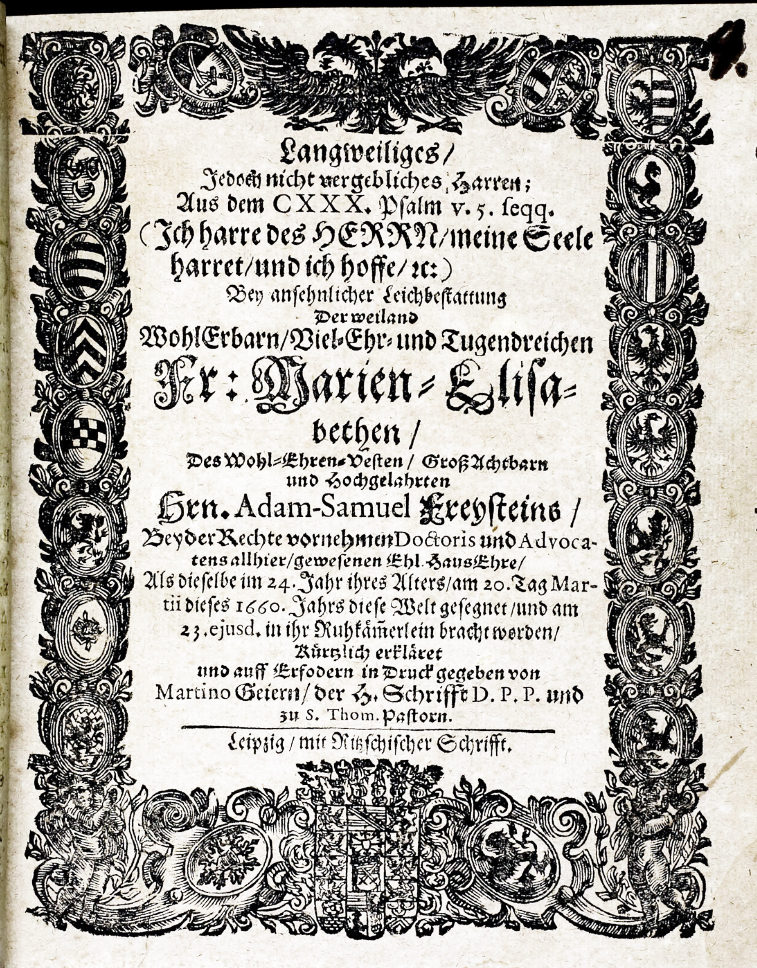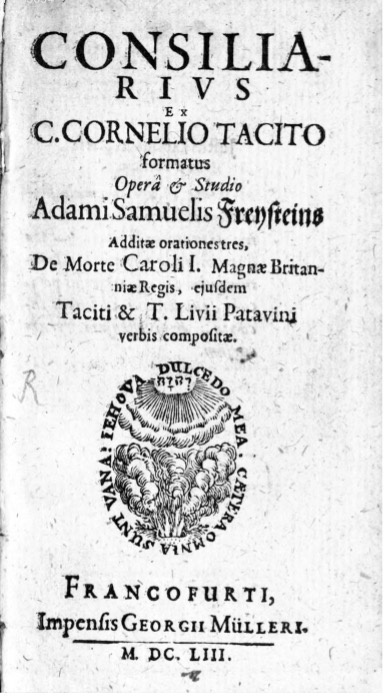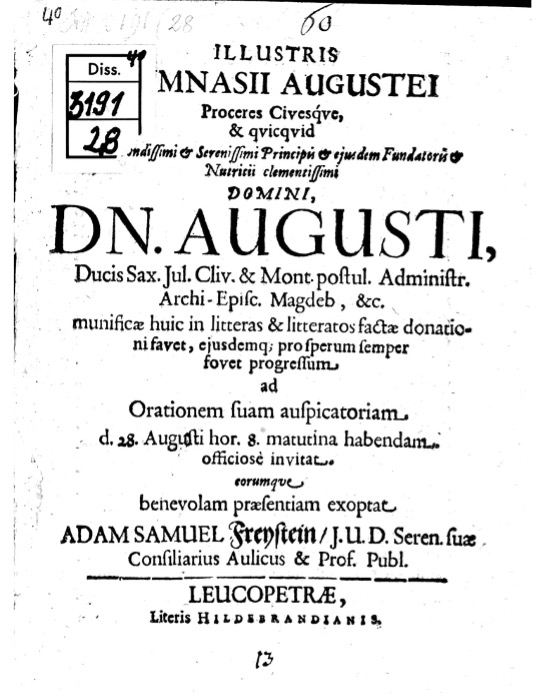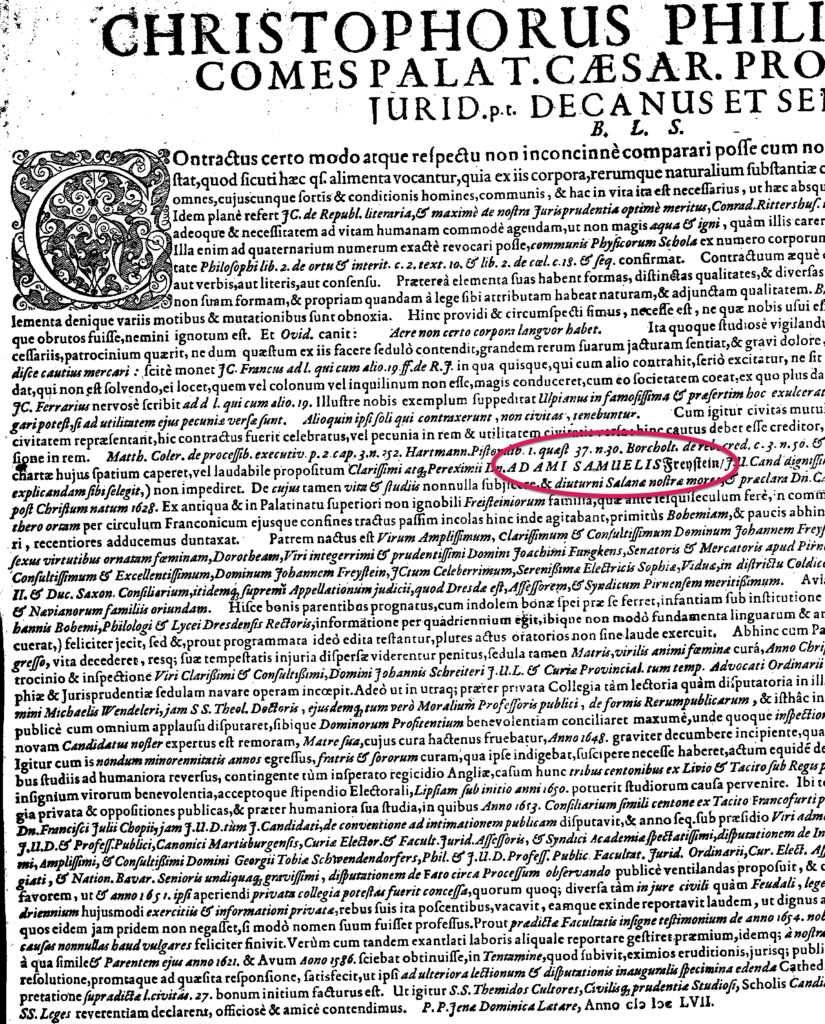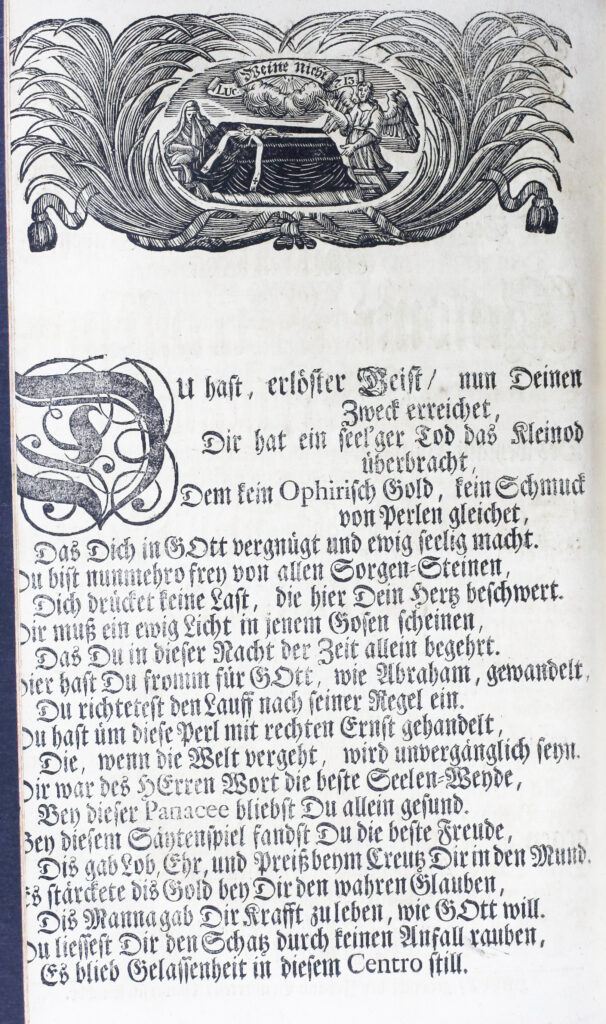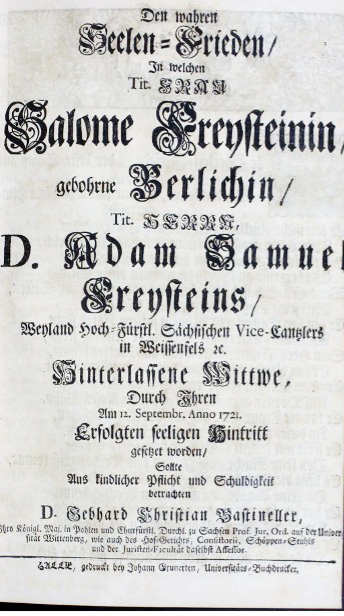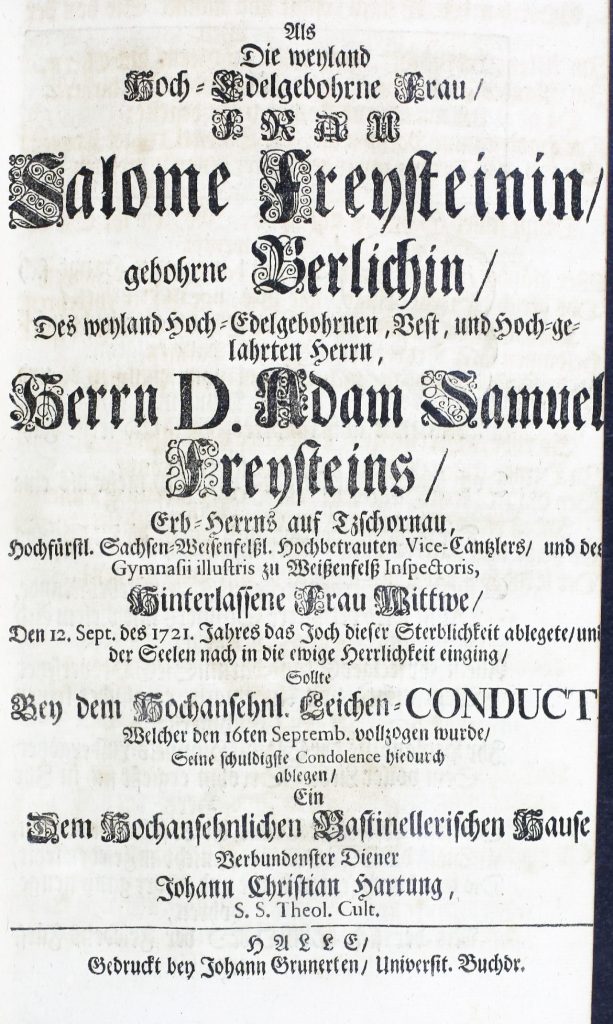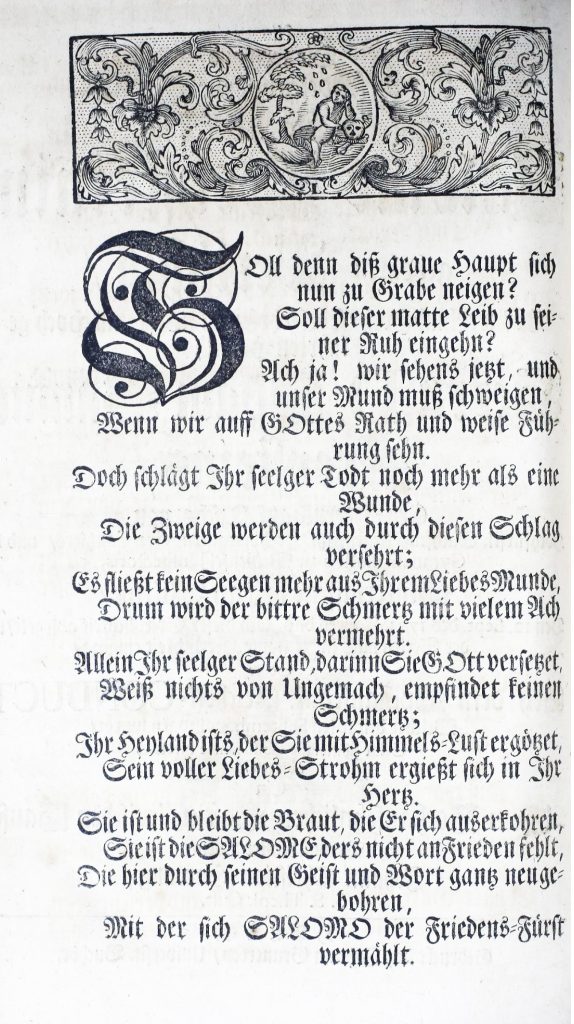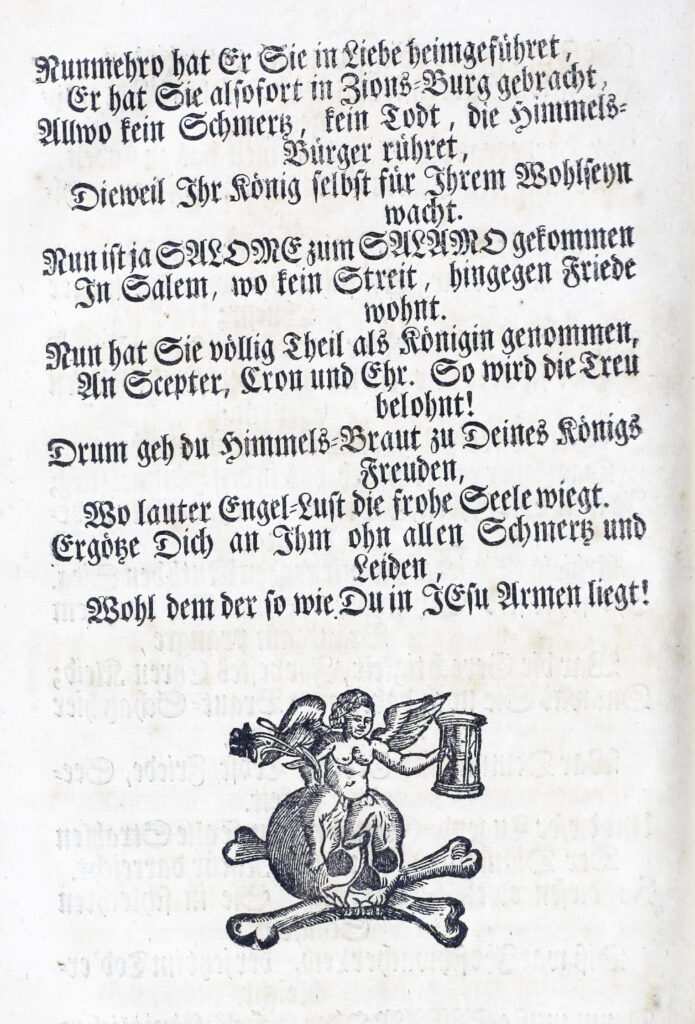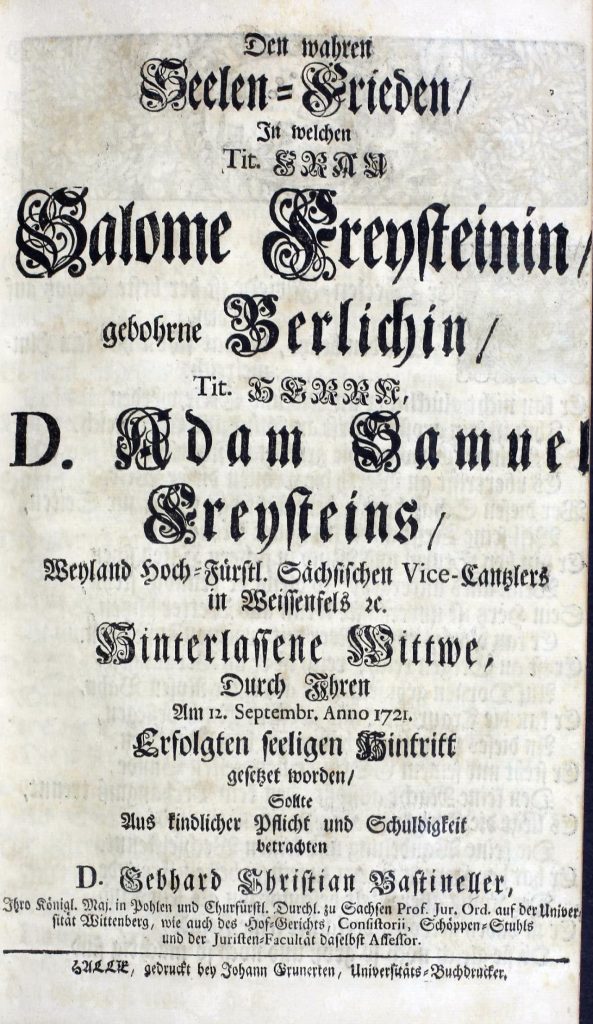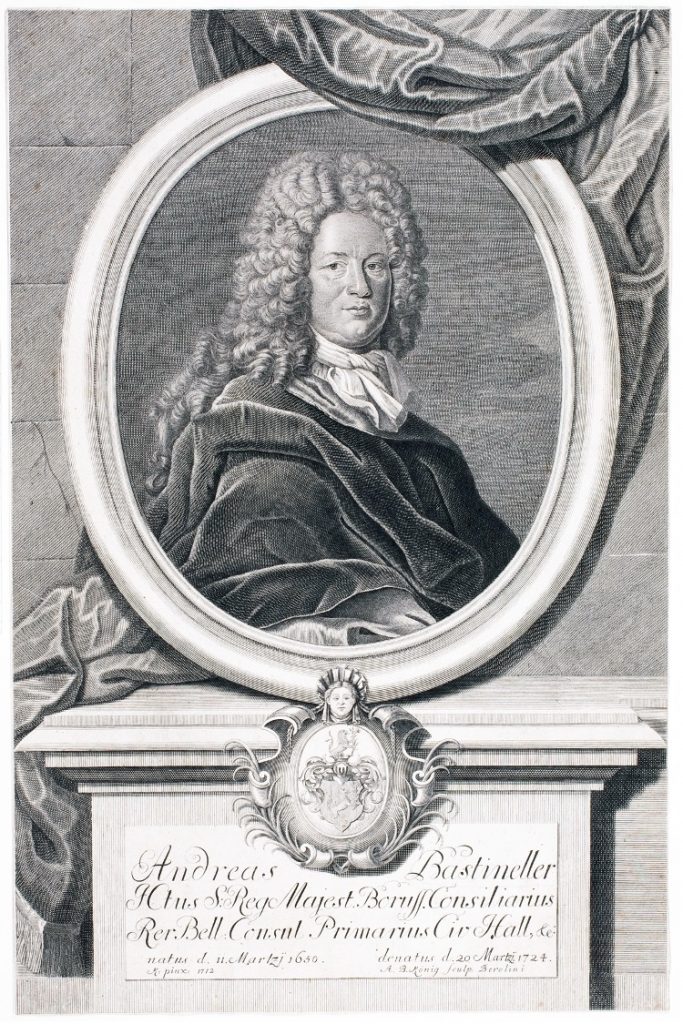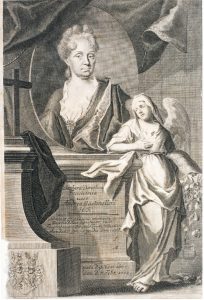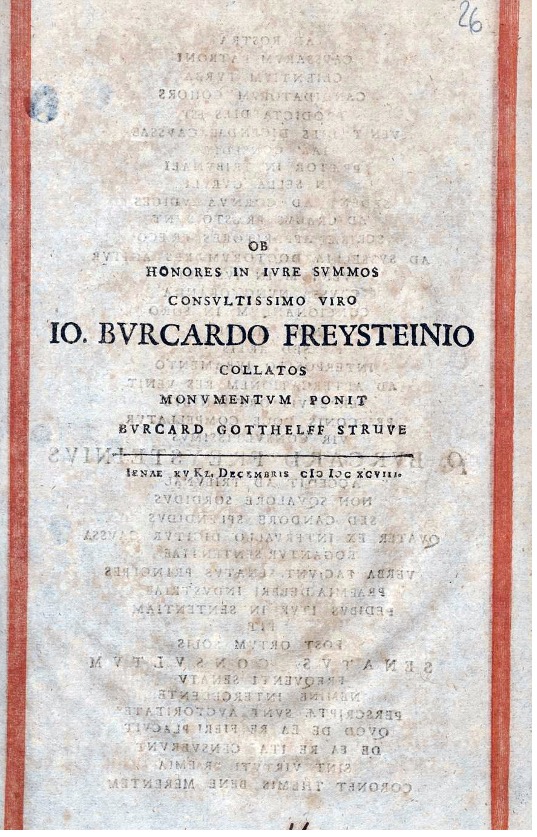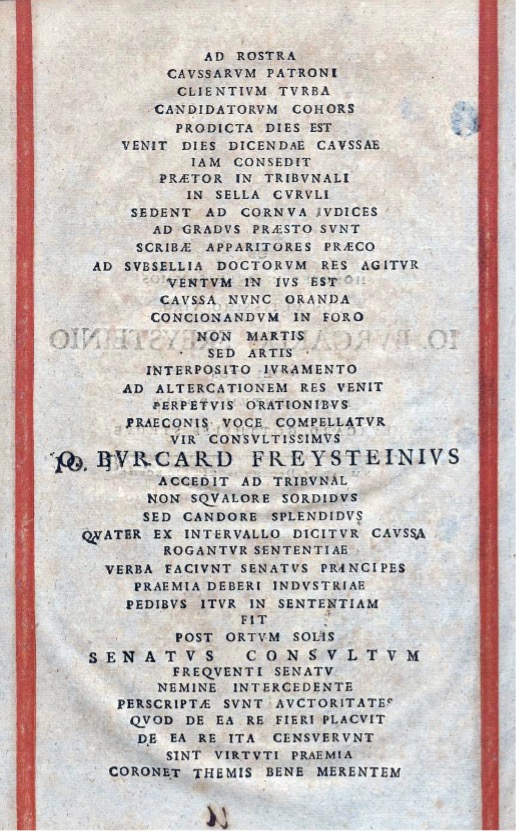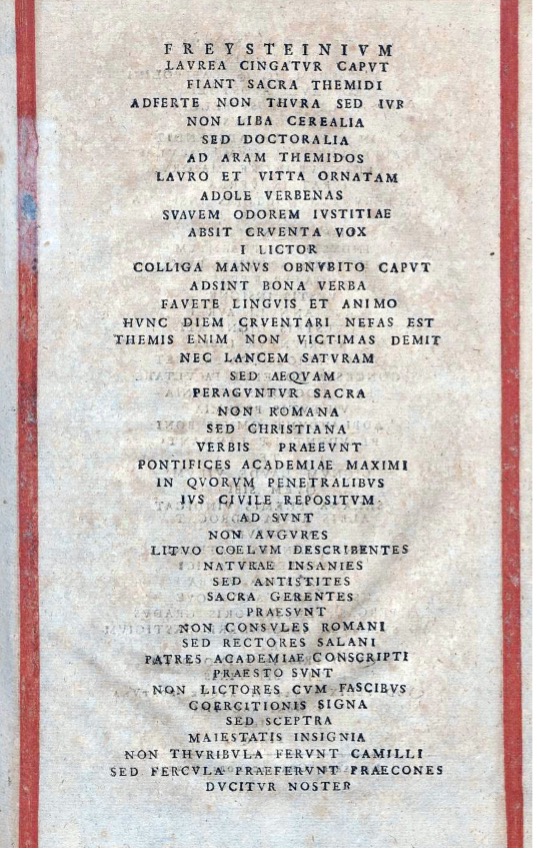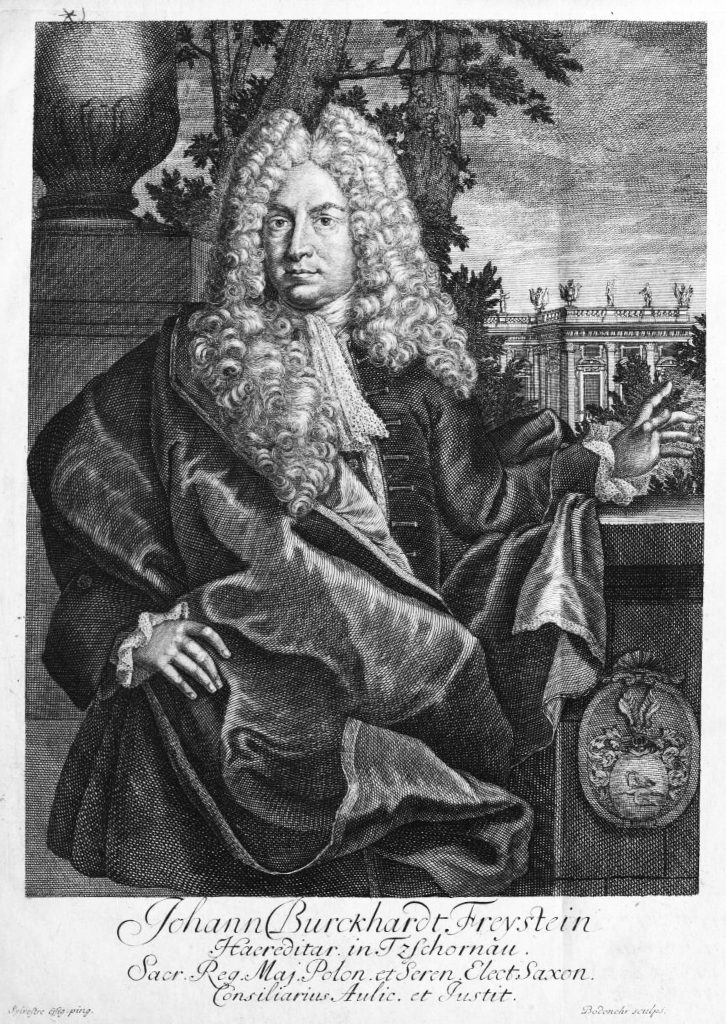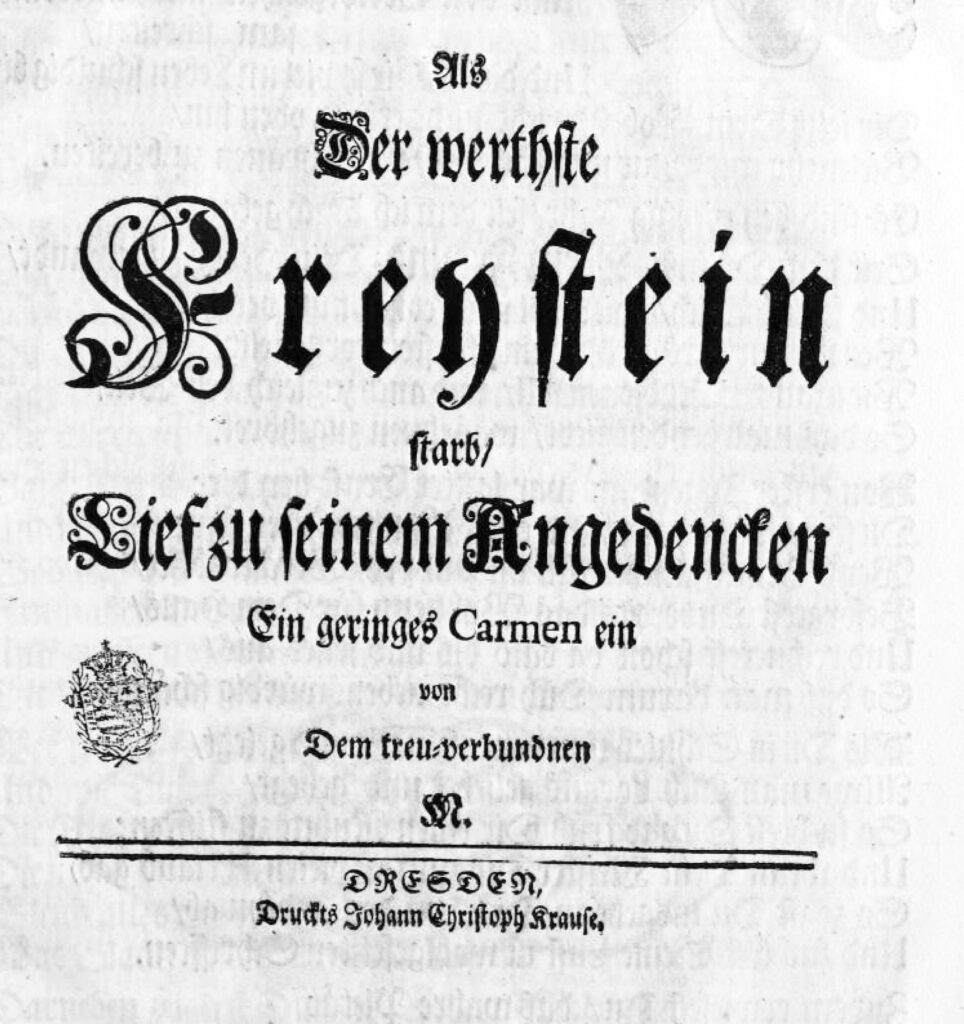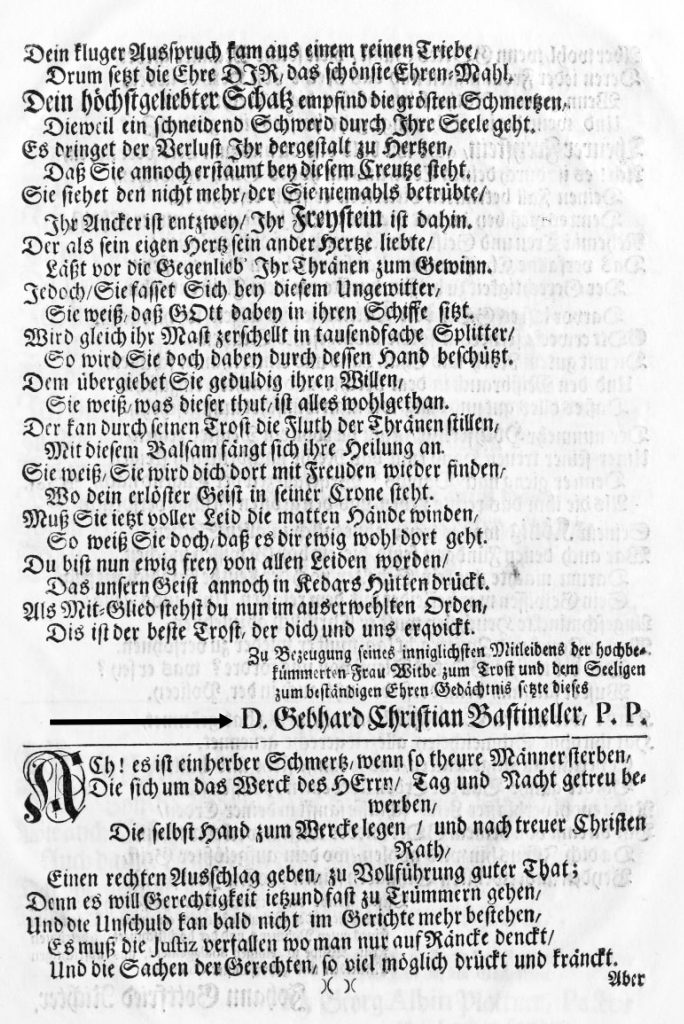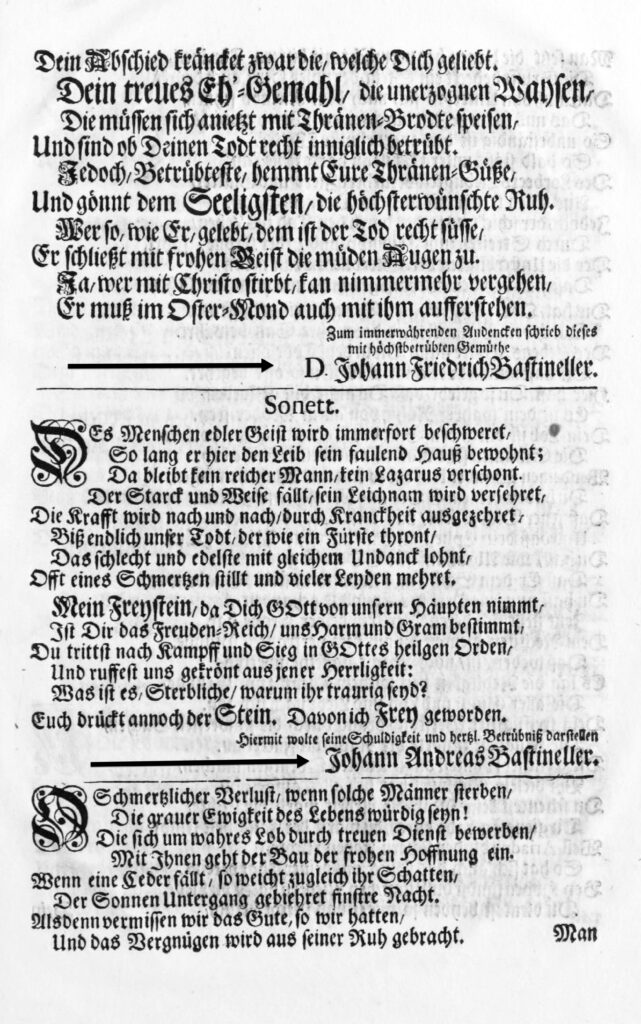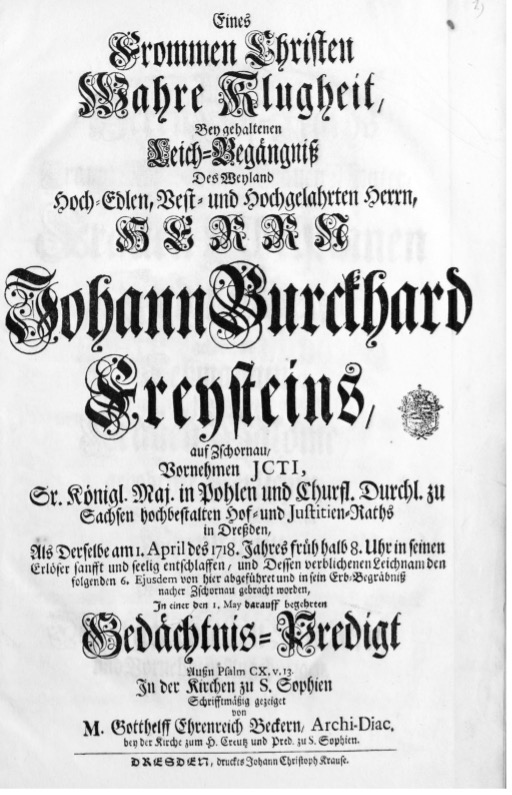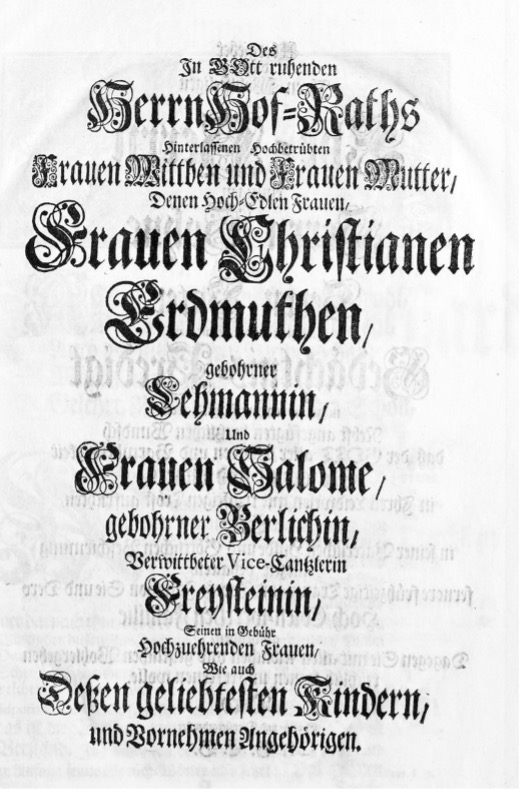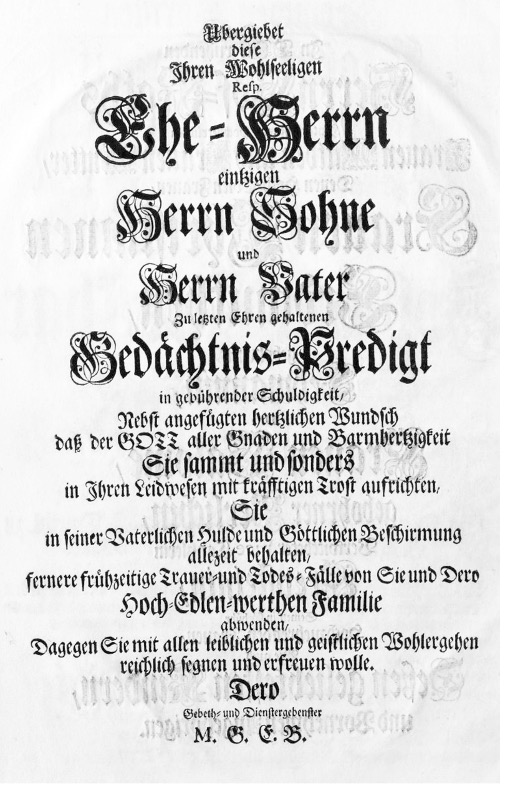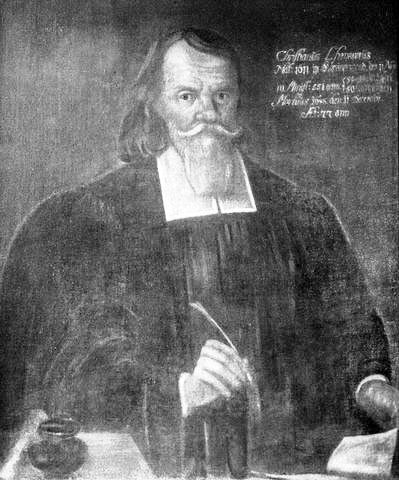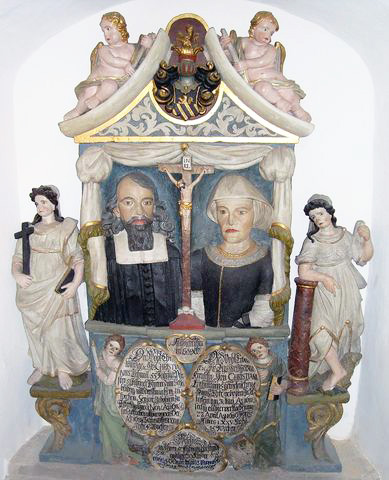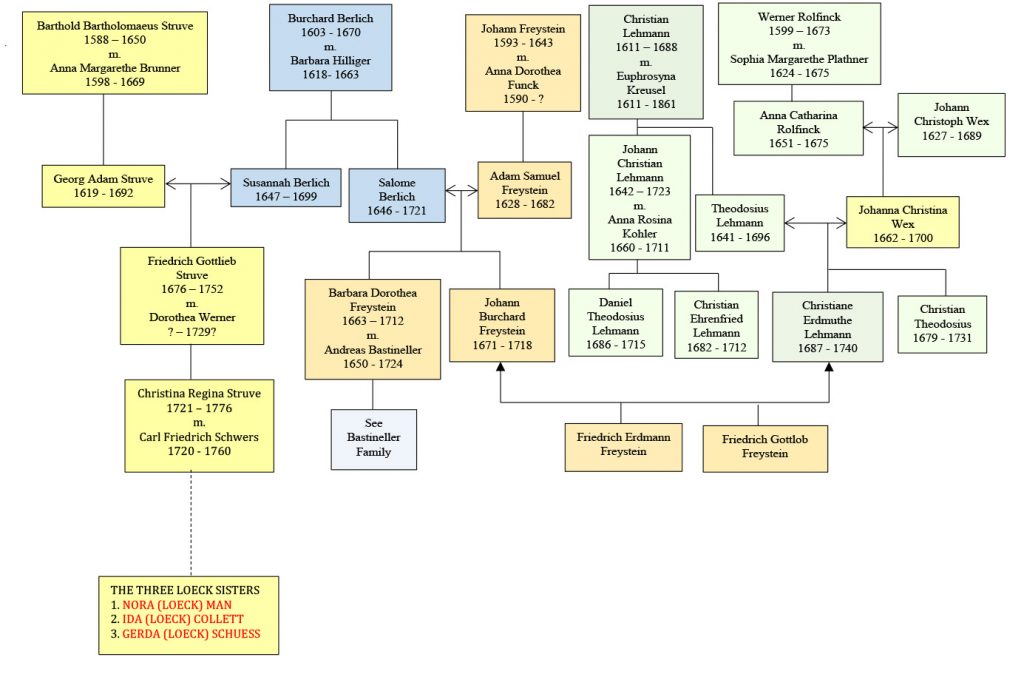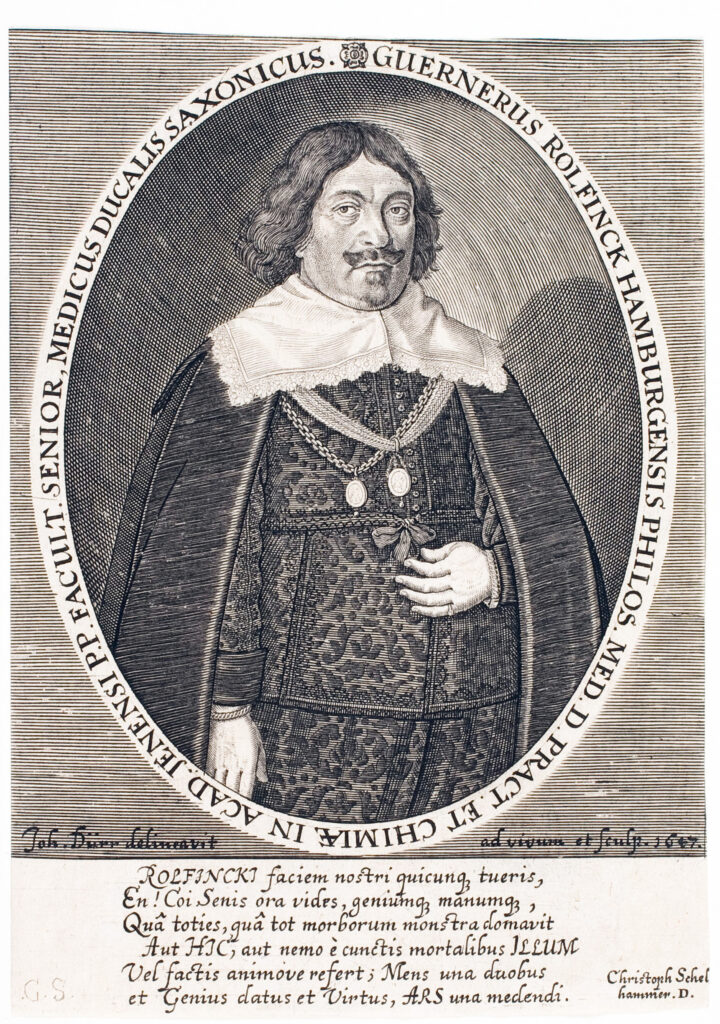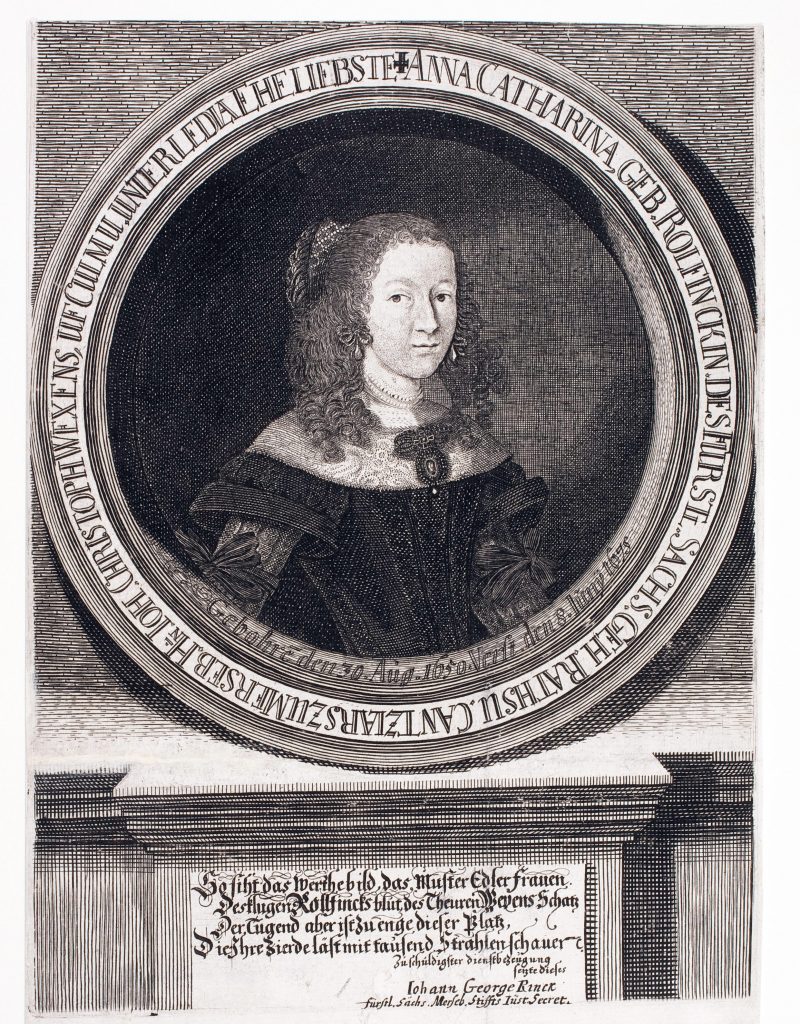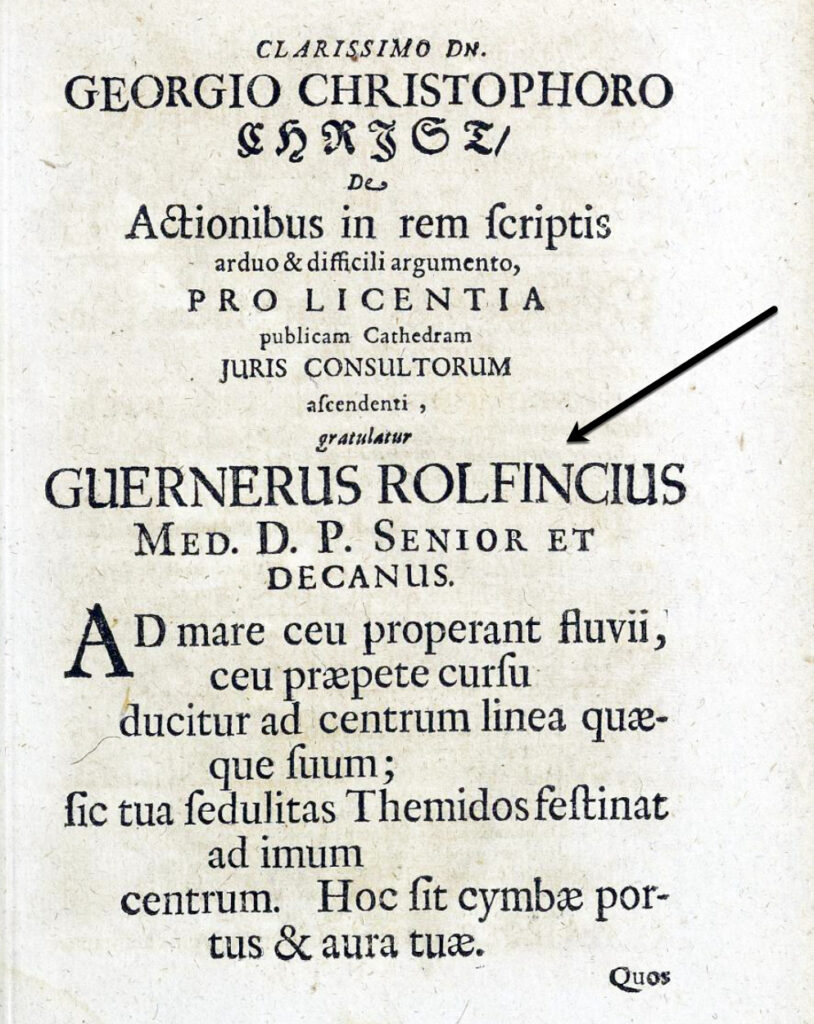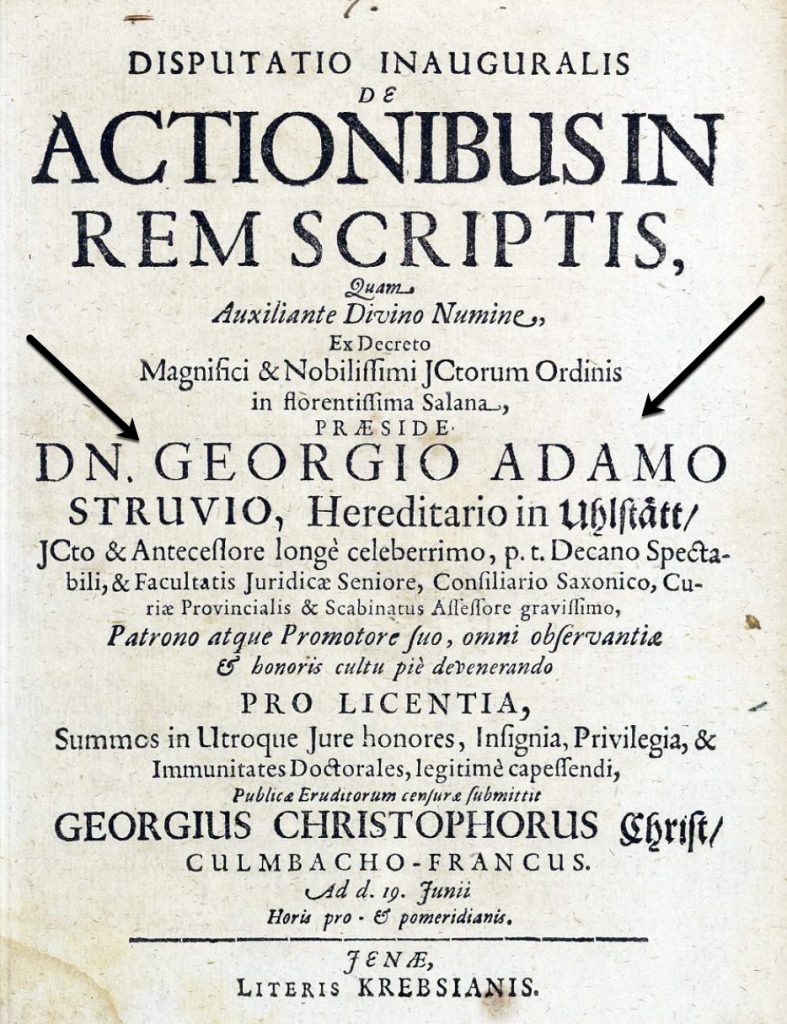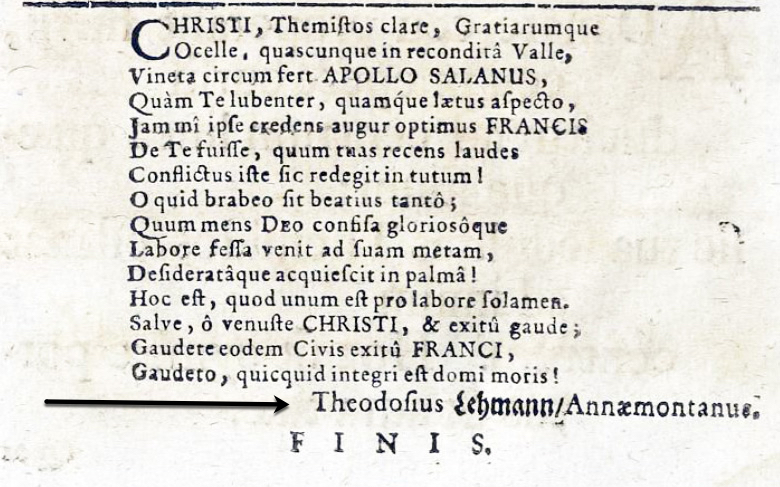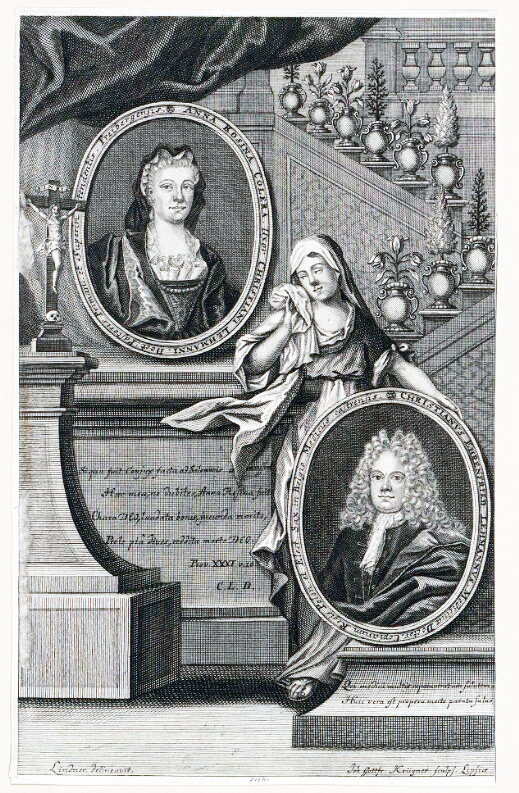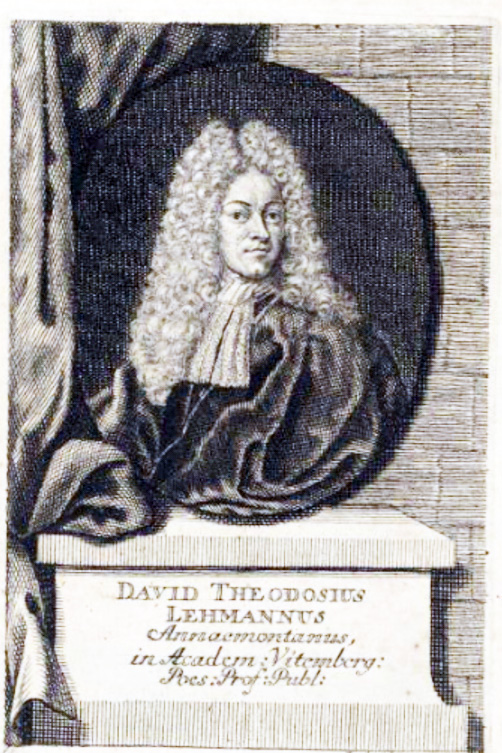Salome Berlich (1646 – 1721) was the daughter of Burchard and Barbara (Hilliger) Berlich and the sister of our direct ancestor Susannah (Berlich) Struve. She married Adam Samuel Fresytein / Freyenstein (1628 – 1682) and they had a daughter Barbara Dorothea (1663 – 1712) who married Andreas Bastineller and a son Johann Burchard (1671 – 1718).
The Freystein family was an old Austrian family, which is said to have flourished under Rudolf von Habsburg. When the family accepted the Lutheran creed at the time of the Reformation, they turned from Austria to the Palatinate and from there to Saxony. Here the family served the Wettin family for four generations; all of them wore the legal doctoral hat from the University of Jena. The great grandfather of Adam Samuel Freystein, D. Johann Freystein, was Saxon Appellationsrat and Syndicus of the City of Pima. He died on February 12, 1609 and is buried in the town church there. Likewise, the grandfather D. Johann Freystein.
Adam Samuel Freystein, was a German Jurist. He started out as a Student in Pirna and Dresden; 1646 student in Wittenberg, 1650 in Leipzig, doctorate in 1658 in Jena. After graduating he became practicing lawyer in Leipzig; in 1666 professor and inspector general at the Weißenfels High School; in 1669 Vice Chancellor to Duke August of Saxony; from 1668 he was a member of the Fruit-bearing Society (The Klärender). He was also temporarily the business manager of the House of Saxony-Gotha. He owned the manor Zschorn near Lüptitz. Below is Adam Samuel’s seal:

Freystein first married Marien Elisabeth Richter but she died in 1660 and as was usual, a funeral book was published to mark the occasion titled: Langweiliges Jedoch nicht vergebliches Harren; Aus dem CXXX. Psalm v. 5. Seqq …
The bibliographic universe records the presence of Adam Samuel Freystein in a number of ways including the following:
Below: Christophorus Philippus Richter D. Comes Palat. Caesar. Prof. P. Facult. Iurid. p.t. Decanus Et Senior, B.L.S …This document is catalogued with Adam Samuel Freystein as a co-author along with Christopher Philipp Richter.
Salome (Berlich) Freystein died on 12th September 1721 and in her honor several funeral books were published some of which are shown below. Als Die Tit: Hoch-Edle, Hoch-Ehr- u… included verse contributions by Johann Andreas Bastineller and Polycarp Leyser. The book also tells us that Salome died at 12 o’clock noon, in the 76th year of her “ … glorious life, in which you saw 39 children, child-children, and child-child-children …” Presumably, 39 children including grandchildren and great grandchildren. Below, pages (left and center) from: Palmen der Danckbarkeit Sollten Nebst denen Trauer-Cypressen Bey dem Ehren-Denckmahl Der weyland Hoch- Right: Als Die Tit: Hoch-Edle, Hoch-Ehr- u. Tugendbelobte Frau, Frau Salome Freysteinin. This funeral book [Palmen der Danckbarkeit Sollten …] mentions that as a grandmother, she raised up Johann Gottfried Bastineller and Gottfried Bastineller as their mother, Barbara Dorothea (Freystein) Bastineller, had died in 1712.
Another example of a funeral book for Salome (Berlich) Freystein: Als Die weyland Hoch-Edelgebohrne Frau, Frau Salome Freysteinin gebohrne Berlichin, Des weyland Hoch-Edelgebohrnen Vest, und Hochgelahrten Herr …
The funeral book for Salome – Bey dem Letzten Ehren-Gedächtniß Der am 12. September 1721 Seelig verstorbenen Frauen, Frauen Salome Freysteinin, gebohrne Berlichin .. included contributions by Friedrich Erdman Freystein and Friedrich Gottlob Freystein.
Yet another funeral book was titled: Den wahren Seelen-Frieden, In welchen Tit. Frau Salome Freysteinin, gebohrne Berlichin, Tit. Herrn, D. Adam Samuel Freysteins, Weyland Hoch-Fürstl. Sächsischen Vice-Cantzlers in Weissenfels [et]c …
Salome’s daughter, Barbara Dorothie / Dorothea (Freystein) Bastineller, married Andreas Bastineller. She died on 7th February 1712 and several funeral books were published in her honour: Die Gemüths-Ruhe Das beste Vergnügen im Leben und Sterben, Wollte Bey dem seeligen Hintritt Der Tot. Tit. Fn. Barbaren Dorotheen, Gebohrnen Freysteinin, … the funeral service was conducted by Christian Otto Mylius. Right, another funeral book: Bey den Unvermutheten doch höchst-seligen Hintritt Der … Frauen Barbaren Dorotheen gebohrner Freysteinin …
Johann Burchard Freystein was the son of Adam Samuel and Salome (Berlich) Freystein and was born in Weissenfels. He studied at the University of Leipzig in law, mathematics, philosophy, and architecture. He spent some time in Berlin and Halle. In 1695 he achieved his doctorate in law at the University of Jena. He then founded his own law firm in Dresden. In 1703 he was a counsellor in Gotha. In 1709, he returned as a counsellor of court and law in Dresden, where he eventually died. Freystein’s hymn “Mache dich, mein Geist, bereit, wache, fleh und bete” can still be found in Protestant hymnals and Johann Sebastian Bach used it as the basis for his chorale cantata Mache dich, mein Geist, bereit, BWV 115.

When a boy, Johann Burchard Freystein received a careful education on a religious basis. He lost his father, Adam Samuel, in 1682 at the age of 11. After being instructed by house teachers, his mother took him to the principal of the Wurzen city school, M. Romanus Teller in board and teaching, and then in his fourteenth year, 1685, to the Gymnasium at Halle, which was then in bloom under the headmaster Johann Prätorius, where the young Freystein studied classical, historical and mathematical subjects and was making such good progress that he was able to move to the University of Leipzig in 1687 at the age of 16.
Like his ancestors, he chose to study the law, joining in particular the two most famous teachers Lüder Mencken and Christoph Schreiter. After three years he wanted to apply to the University of Jena, but instead was brought in for some practical work by the well-known lawyer Privy Councilor Georg Adam Struve, after which he returned to Leipzig and completed his studies there in about 1691. After the custom of that time, Freystein planned for a journey abroad following his university studies, but he was prevented from carrying out his plan by illness. Instead, the young man was content to visit some “remarquable places” in Germany, namely Berlin. There, they wanted to keep him, but he was drawn back to the country where his forefathers had served
After a short stay in Halle, Johan Burchard came to Dresden, where he remained until his death. At first, he partnered with D. August Becker in his legal practice who advised the capable young man to earn a doctorate in law which he did with a thesis “Idea. Architecti iuris periti” and he received his doctorate from the University of Jena in 1695. He may have worked as a legal adviser in Dresden for around ten years when he was appointed by duke Friedrich of Gotha in 1703 and entrusted with important programs. As a result, the sovereign August the Strong seemed to have noticed him; and in 1709 he made Freystein a court and judicial councilor and involved him in improving procedural rules. As a result, he showered him with titles and dignities.
On 16th November 1701 at Freiberg, Johann Burchard married Christiane Erdmuthe Lehmann, daughter of the Judiciary Councilor and Consistorial President of Merseburg, Theodosius Lehmann, and niece of the Freiberg superintendent D. Lehmann. Six children emerged from this marriage: Christian Friedrich, Friedrich Erdmann, Christiane Erdmuthe, Heinrich Gottlob, Friedrich Gottleib, Erdmuthe Henriette. Two sons and a daughter died before their father.
Burchard Gotthelf Struve published in 1698 Ob Honores In Iure Summos Consultissimo Viro Jo. Burcardo Freysteinio Collatos …
Johann Burchard was equipped with good health, but he became asthmatic due to his sedentary lifestyle and oppressive workload. The use of the Eger Sauerbrunn brought him relief, as did a cure in Karlovy Vary in 1713. However, the disease could not be remitted. It increased from year to year, and in November 1717 Freystein could no longer go to the Begienmg. At the end of this year and at the beginning of 1718 violent catarrhs with choking attacks occurred which made him bedridden. Dr. Troppaneger, Dr. Berger and Dr. Lichtenhan searched with all their medical arts, but for nothing, the patient was falling into disrepair and Freystein looked forward to his dissolution with Christian composure. He wished for his own redemption, prayed diligently, and consoled himself with the story of the Passion.
On April 1, 1718 he died gently, it was early 1/8 am, his age 46 years 11 months 12 days. His wife, three children, and his elderly mother (Salome Berlich) mourned his death and on April 7, his body was buried in Freystein’s inheritance in Zschorn. Only a long time later, on May 1, the actual funeral service was held. It took place at the Sophien kirche in Dresden.
The widow Freystein stayed and lived in Dresden in the house her husband had erected shortly before his death. This house was in the area of the Kreuz kirche, which Freystein had already bought for the price of 325 thalers from a woman from Neitschütz in 1707. Freystein’s fortune was not small. His widow was a tutor for her two sons Friedrich Erdmann and Friedrich Gottlieb. The latter writes “I was very well tutored by this very clever and educated, excellent lady, had my good table, a wonderful room and a really sunny salmium. In their blessed home, after the good ‘villas of my god, I had to smile at one lucky star after the other.”
The funeral books for Johann Burchard are accompanied by a portrait of Freystein, after a painting by Sylvestres, engraved in copper by Bodenehr. This portrait shows a serious-looking, noble man, in the scholarly costume of his time, pointing to a magnificent building standing in the background.
He was generally regarded as an authority in the field of legal and administrative knowledge along with a particular interest in Architecture. He was a close observer of the law and justice. In a time of litigation, where many lawyers fueled the arguments of the clients and artificially prolonged their legal trade, he committed his honor to “shorten the most important processes.”
The latter sold the estate to the councilor Christiana Erdmuth in 1725. Freystein, who died in 1740. http://recherche.lha.sachsen-anhalt.de/Query/detail.aspx?ID=1980320
The quality of inheritance was revoked by Elector Friedrich August II. 1748 (now Mannlehngut), which led to disputes. The dispute was not yet over, when the last son, Friedrich Gottlieb Freystein, died in 1771 without male heirs and the bailiff at Bitterfeld was commissioned by the Lehnhof to take possession of the fallen home. The sister Erdmuthe Henriette appealed and through the Appellate Councilor Leyser she achieved the re-establishment of the estate in 1772 and the conversion back into an inheritance. She sold Beyersdorf in 1772 to Friedrich Wilhelm von Stentzsch.
It is said that Freystein united the virtues of the efficient official, the honest man, the warm-hearted patriot, the good husband and father, the brave church patron, and the pious Christian. According to one of his funeral books, Johann Burchard Freystein died in the evening on 7th April 1718.
On the death of Johann Burchard Freystein, several funeral books were published, including: Als Der werthste Freystein starb, Lief zu seinem Angedencken Ein geringes Carmen ein …
Another funeral book – Eines Frommen Christen Wahre Klugheit, Bey gehaltenen Leich-Begängniß Des Weyland … Herrn Johann Burckhard Freysteins … Als Derselbe am 1. April des 1718 …
THE FREYSTEIN – LEHMANN CONNECTION – Christiane Erdmuth (Lehmann) Freystein (1687 – 1740)
Christiane was the wife of Johann Burchard Freystein. Her father was Theodosius Lehmann (baptized April 17, 1641 in Annaberg; died August 27, 1696 in Merseburg). He was a court official of the Duchy of Saxony-Merseburg and a judiciary and consistorial advisor in Merseburg. Through him the social advancement of the Lehmann family was initiated, which was continued by his son Christian Theodosius Lehmann ( 1679 – 1731) through the confirmation of the nobility.
Theodosius Lehmann came from the Saxon Ore Mountains. His father was the Protestant pastor Christian Lehmann in Scheibenberg, whose eldest son he was. Johann Christian (1642 – 1723) and Immanuel Lehmann (1645 – ) were his brothers.
Theodosius’ childhood and youth fell in the last years of the Thirty Years’ War, during which the Ore Mountains were almost incessantly troubled and plundered by troops of Swedish and imperial mercenaries.
In 1670 he successfully completed his doctorate in law at the University of Jena with the dissertation De Iuribus Ac Privilegiis Senum. From 1674 to 1678 he was chamber procurator in Bautzen. In 1679 he entered the service of the Duke of Sachsen-Merseburg.
In 1684 he acquired the manor Culm in Thuringia from his father-in-law. In 1688 Theodosius Lehmann bought the third part of the Löbitz manor from the councilor Hans Haubold von Kötteritz. This manor acquisition in the Weißenfels office later played an important role in the confirmation of the lost nobility rise to his only son Christian Theodosius Lehmann by Emperor Leopold in Vienna in 1703.
When Theodosius Lehmann died, he left his widow Johanna Christina Lehmann nee Wex, whom he married in 1677, and who was the youngest daughter of the Court and Chamber Councilor and also Chancellor of Merseburg Dr. Johann Christoph Wex.
It should be noted that the maternal grandfather of Christiane Erdmuth (Lehmann) Freystein, Johann Christoph Wex had married Anna Catharina Rolfinck (1651 – 1675) who was the daughter of Werner Rolfinck (1599 – 1673).
To bring us back to the Struve family, we should note that George Adam Struve, Theodosius Lehmann and Werner Rolfinck often contributed to each other’s books such that the bibliographic record is strewn with examples of their bibliographic output where all three men can be found working together in some combination with one another. For example, the work: Disputatio Inauguralis De Actionibus In Rem Scriptis Quam … Ex Decreto Magnifici & Nobilissimi ICtorum Ordinis in florentissima Salana, Praeside Dn. Georgio Adamo Struvio … [1666] was supervised by Georg Adam Struve along with contributions to it made by Rolfinck and Lehmann:
The granddaughter of our Nth great aunt Salome (Berlich) Freystein – Elisabeth Charlotte Bastineller (1684 – 1726) married Christian Otto Mylius who came from a prominent legal family. After Elisabeth Charlotte died Christian Otto married her sister Christiane Rosine Batineller. A separate page on the Mylius family can be seen HERE.
